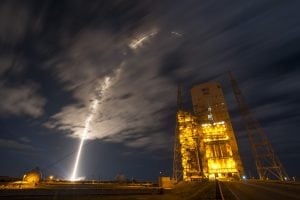Latest News
[Via Satellite 03-23-2016] Orbital ATK completed the company’s second mission with United Launch Alliance (ULA) on March 22, launching its Cygnus spacecraft atop an Atlas 5 rocket. The company used ULA’s Atlas 5 in lieu of its own Antares launch vehicle, which the company is preparing to launch with the RD-191 instead of the AJ-26 later this year. The OA-6 launch, Orbital ATK’s fifth operational cargo resupply mission, carries approximately 7,900 pounds (3,600 kilograms) of cargo and small satellites. The total payload was more than 16,000 pounds, making it the heaviest Atlas 5 mission to date.
Cygnus will be grappled and connected to the International Space Station (ISS) at approximately 6:00 a.m. (EDT) on Saturday, March 26. The spacecraft will remain attached for approximately two months before departing with roughly 4,400 pounds (2,000 kilograms) of disposable cargo for a safe, destructive reentry into Earth’s atmosphere over the Pacific Ocean.
Before entering Earth’s atmosphere, Cygnus will enter a specific orbit to deploy five CubeSats using a NanoRacks CubeSat deployer aboard the spacecraft. Also taking place onboard Cygnus, the Spacecraft Fire Experiment-I (Saffire-I) will study the behavior of a large fire in microgravity. The final experiment to take place aboard the Cygnus is the Reentry Breakup Recorder (REBR), which will measure and record Cygnus’ disintegration as it reenters Earth’s atmosphere.
Orbital ATK has two additional Commercial Resupply Services 1 (CRS-1) missions scheduled in 2016. The company’s upgraded Antares launch vehicle remains on schedule for a full-power hot-fire test in late spring. Flight operations for Cygnus and Antares are to resume mid-year from NASA’s Wallops Flight Facility in eastern Virginia.
Through CRS-1, Orbital ATK will deliver approximately 59,000 pounds (26,800 kilograms) of cargo to the ISS over 10 missions through 2018. Beginning in 2019, the company will continue its support of the ISS and its crew through a minimum of six initial cargo missions under the recently awarded CRS-2 contract.
Get the latest Via Satellite news!
Subscribe Now